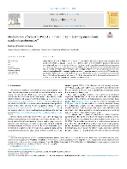Medium-run effects of COVID-19 induced distant learning on students’ academic performance

Datum vydání
2024Publikováno v
Labour EconomicsRočník / Číslo vydání
Neuveden (89)ISBN / ISSN
ISSN: 0927-5371ISBN / ISSN
eISSN: 1879-1034Informace o financování
MSM//LX22NPO5101
Metadata
Zobrazit celý záznamKolekce
Tato publikace má vydavatelskou verzi s DOI 10.1016/j.labeco.2024.102601
Abstrakt
Administrative data on bachelor students for 2014/15 to 2022/23 academic years are used to analyze their performance before, during, and - what is new in the literature - after the COVID-19 pandemic. The analysis reveals that both low- and high-ability students of all affected cohorts received better grades during the semesters when teaching and examinations were delivered online, with the effect on low-ability students continuing through the first after-COVID academic year. However, improved grades contrast with lower graduation rates, especially among high-ability students. Detailed analysis of graduation patterns coupled with ECTS credits take-up analysis suggests that high-ability students were often discouraged from studying during the pandemic. For low-ability students, the negative influence of COVID-19 was compensated by the lenient grading policy that allowed them to pass the compulsory exams and continue studying.
Klíčová slova
Covid-19 pandemic, university students, grade inflation, graduation rates
Trvalý odkaz
https://hdl.handle.net/20.500.14178/2673Licence
Licence pro užití plného textu výsledku: Creative Commons Uveďte původ 4.0 International





